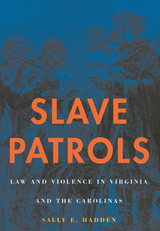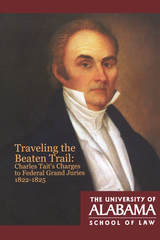
Obscured from our view of slaves and masters in America is a critical third party: the state, with its coercive power. This book completes the grim picture of slavery by showing us the origins, the nature, and the extent of slave patrols in Virginia and the Carolinas from the late seventeenth century through the end of the Civil War. Here we see how the patrols, formed by county courts and state militias, were the closest enforcers of codes governing slaves throughout the South.
Mining a variety of sources, Sally Hadden presents the views of both patrollers and slaves as she depicts the patrols, composed of "respectable" members of society as well as poor whites, often mounted and armed with whips and guns, exerting a brutal and archaic brand of racial control inextricably linked to post-Civil War vigilantism and the Ku Klux Klan. City councils also used patrollers before the war, and police forces afterward, to impose their version of race relations across the South, making the entire region, not just plantations, an armed camp where slave workers were controlled through terror and brutality.

During his career at Harvard, Morton Horwitz changed the questions legal historians ask. The Transformation of American Law, 1780–1860 (1977) disclosed the many ways that judge-made law favored commercial and property interests and remade law to promote economic growth. The Transformation of American Law, 1870–1960 (1992) continued that project, with a focus on ideas that reshaped law as we struggled for objective and neutral legal responses to our country’s crises.
In this book, Horwitz’s students re-examine legal history from America’s colonial era to the late twentieth century. They ask classic Horwitzian questions, of how legal doctrine, thought, and practice are shaped by the interests of the powerful, as well as by the ideas of lawyers, politicians, and others. The essays address current questions in legal history, from colonial legal practice to questions of empire, civil rights, and constitutionalism in a democracy. The essays are, like Horwitz, provocative and original as they continue his transformation of American legal history.

About Occasional Publications of the Bounds Law Library
This collection offers a series of edited documents that contribute to an understanding of the development of legal history, culture, or doctrine. Series editors Paul M. Pruitt Jr. and David I. Durham have selected a variety of materials—a lecture, diaries, letters, speeches, a ledger, commonplace books, a code of ethics, court reports—to illustrate unique examples of legal life and thought.
READERS
Browse our collection.
PUBLISHERS
See BiblioVault's publisher services.
STUDENT SERVICES
Files for college accessibility offices.
UChicago Accessibility Resources
home | accessibility | search | about | contact us
BiblioVault ® 2001 - 2024
The University of Chicago Press









